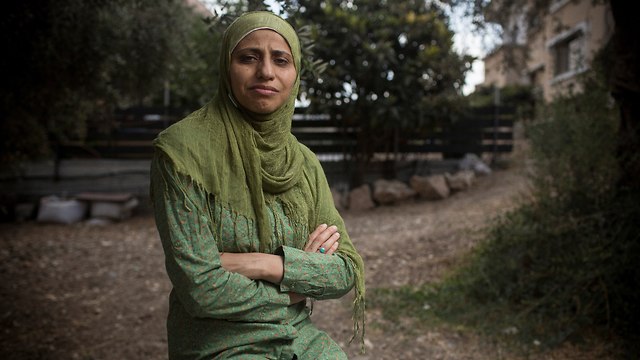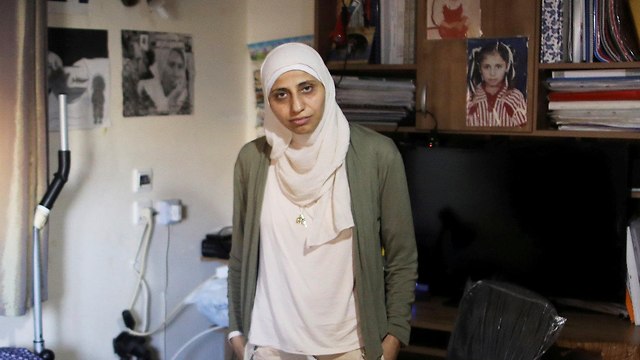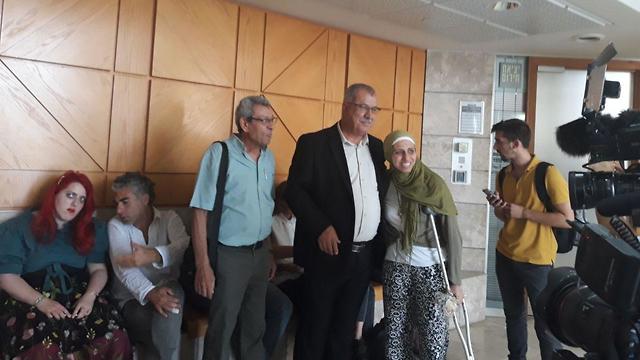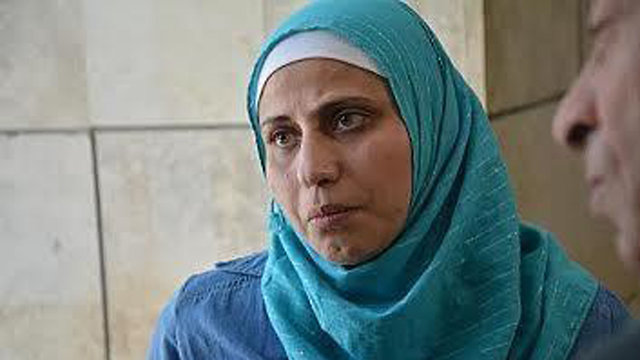

Israeli court jails Arab poet for inciting terrorism online
Dareen Tatour sentenced to five months after being convicted of incitement to terrorism for a poem and remarks she posted on social media during a wave of Palestinian terrorism attacks; 'Resist, my people, resist them / Resist the settlers robbery / And follow the caravan of martyrs,' the poem reads.
Arab poet Dareen Tatour, 36, was sent to five months in prison on Tuesday, after being convicted three months ago of incitement to violence under the Terrorism Law and supporting a terrorist organization over a poem she posted online calling for violent resistance to the occupation.
Tatour posted a video of herself on Facebook and YouTube reading out her poem "Resist, My People, Resist", as a soundtrack to footage of masked Palestinian youths throwing stones and Molotov cocktails at IDF soldiers.
Tatour published her poem in October 2015 during the outbreak of the "lone wolf intifada," a series of deadly Palestinian terrorist stabbing, shooting and car ramming attacks on Israelis. She was arrested a few days later.
The state claimed that the defendant, who did not know her target audience, could have provoked fans to carry out attacks. Prosecutors said her post was a call for violence.
Tatour, who denied the charges, said her poem was misunderstood by the Israeli authorities. It read: "Resist, my people, resist them / Resist the settlers robbery / And follow the caravan of martyrs."
She said there was no call for violence in the poem, rather for a struggle, which Israeli authorities had cast as violent.
The judge delivered a 52-page verdict that went into a detailed literary analysis of the text and video, and of the Arabic word "shahid"—which means "martyr" in English.
Language experts called by the defense as witnesses included a famous Israeli poetry professor and an expert in Arabic-Hebrew translation.
The translator told the court that "shahid" meant different things to people on different sides of the Israeli-Palestinian conflict.
"The Israeli hears 'shahid' and sees an aggressor. The Palestinian sees a victim. That's a big difference. One sees an attacker blowing up a bus, the other sees a child shot by soldiers," the expert, Yonatan Mendel, told the court in March 2017.
Tatour was also charged with supporting a terrorist group. Prosecutors said she had expressed support for the Palestinian terror group Islamic Jihad's call for an uprising.
In addition, after a woman from Nazareth tried to stab a soldier and was shot at the Afula Central Bus Station in October 2015, Tatour posted the terrorist's photo on her Facebook and wrote "I'm the next shahid."
The judge, however, noted in her ruling that the poem was presented with a backdrop of violent rioting rather than "a backdrop typical to the reality of the occupation," as the defendant claimed.
According to the judge "the aforementioned violent video does not include images of casualties and victims or legal protests. The video reflects only violent resistance/uprising throughout."
"The combination leaves no interpretation of the word 'martyr' other than a violent interpretation that incites to terrorism, and to follow martyr-attackers," the verdict said.
"The freedom of expression is not absolute," the judge went on to write. "In a case such as this—in which it is clear there is a call for an act of terrorism posted among thousands of members of the defendants' Facebook group and among an unlimited audience on YouTube, along with a video that bolsters the call for violence that comes from the text—the poem cannot receive the protection of the court merely because the words of incitement were written as a poem."
The prosecutor in the case said following the sentencing, "Today a message was conveyed that words also have meaning and freedom of speech is not equivalent to granting permission to support terrorism."
Tatour told reporters at the Nazareth Magistrate's Court she "wasn't expecting justice to be done. The case was political from the start, because I am Palestinian and support freedom of speech."
The court added a six-month suspended sentence to Tatour's jail time.
Her lawyer, Gaby Lasky, said Tatour would appeal both the verdict and the sentence.
.
Indictments for online incitement have tripled in Israel since 2014. Prosecutions by the IDF have also increased in Palestinian territories—most of those charged are young Palestinians.
The campaign against alleged incitement has raised questions about the balance between security and free speech.
On July 18 the Knesset was set to pass legislation that would have empowered the justice system to order Internet providers, such as Facebook and Google, to take down social media posts in Israel deemed as incitement. But hours before the scheduled vote Prime Minister Benjamin Netanyahu shelved the bill.
An adviser to Netanyahu, Jonatan Urich, said the law was open to a too-wide interpretation that could allow cyber-censorship and harm freedom of speech.



















